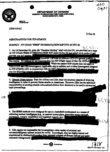Bleep censor
A bleep censor is the replacement of a profanity or classified information with a beep sound (usually a ![]()
Usage

Bleeping has been used for many years as a means of censoring TV programs to remove content not deemed suitable for "family", "daytime", "broadcasting", or "international" viewing and personal information for privacy.[1] The bleep censor is a software module, manually operated by a broadcast technician.[2] A bleep is sometimes accompanied by a digital blur or box over the speaker's mouth in cases where the removed speech may still be easily understood by lip reading.[3]
On closed caption subtitling, bleeped words are usually represented by "(...)", sometimes the phrases "[expletive]", "[censored]", "[bleep]", "[explicit]" occasionally hyphens (e.g. abbreviations of the word "fuck" like f—k f---), and sometimes asterisks or other non-letter symbols (e.g. other abbreviations of "fuck" like ****, f***, f**k, f*ck, f#@k or f#@%), remaining faithful to the audio track. "Cunt" and "shit" may also be censored in the same manner (e.g. c***, c**t, c*nt, c#@t or c#@% and s***, s**t, sh*t, s#@t or s#@%, respectively). The characters used to denote censorship in text (e.g. p%@k, %$^&, mother f%@$er, bulls%@t or c#@t) are called grawlixes[4]. Where open captions are used (generally in instances where the speaker is not easily understood), a blank is used where the word is bleeped. Occasionally, bleeping is not reflected in the captions, allowing the unedited dialogue to be seen. Sometimes, a "black bar" can be seen for closed caption bleep.[5]
Bleeping is normally only used in unscripted programs – documentaries, radio features, panel games etc. – since scripted drama and comedy are designed to suit the time of broadcast. In the case of comedies, most excessive bleeping may be used for humorous purposes.[6]
Other uses of bleep censoring may include reality television, infomercials, game shows and daytime/late night talk shows, where identifying information such as ages, surnames, addresses/hometowns, phone numbers and attempts to advertise a personal business without advanced or appropriate notice will be silenced or bleeped to maintain the subject's privacy (such as seen for subjects arrested in episodes of COPS).[7]
When films are edited for daytime TV, broadcasters usually prefer not to bleep swearing, but cut out the segment containing it, replace the speech with different words, or cover it with silence or a sound effect.
In the United Kingdom, under Ofcom guidelines, television and radio commercials are not allowed to use bleeps to obscure swearing.[8] However, this does not apply to program trailers or cinema advertisements. In the United States, the FCC has the right to regulate un-bleeped indecent broadcasts, but neither actively monitors television broadcasts nor keeps a record of television broadcasts.[9] The FCC enforces indecency laws on reports of un-bleeped indecency occurring during watershed (the time when adult programming is allowed to be broadcast) that are documented by the public.[10]
Some television and cinematic productions work around the requirement of a censor bleep by writing dialogue in a language that the intended audience is unlikely to understand (for example, Joss Whedon's Firefly used untranslated Chinese curses to avoid being 'bleeped'[11], while the Star Trek: The Next Generation episodes "The Last Outpost" and "Elementary, Dear Data" have the character of Capt. Jean-Luc Picard utter the French obscenity, merde, which is equivalent to "shit" in English.).
See also
- Expurgation
- Family Viewing Hour
- Grawlix
- Minced oath
- Pixelization
- Profanity
- Radio edit
- Sanitization (classified information)
- Self-censorship
- Tape delay (broadcasting)
- "Beep" (song), a 2006 song by The Pussycat Dolls which incorporates bleeps; see also the 2010 3OH!3 song "Touchin' on My"
- "I Bet You They Won't Play This Song on the Radio", a song by Eric Idle that uses comic sound effects for many bleeps
- The Morning Show with Mike and Juliet, an American talk show that, in 2008, gained notoriety for using a variation of the bleep censor dubbed a "bleep photo"
References
- Bustillos, Maria (2013-08-27). "Curses! The birth of the bleep and modern American censorship". The Verge. Retrieved 2019-08-20.
- "Bleep-censor dictionary definition | bleep-censor defined". www.yourdictionary.com. Retrieved 2019-08-20.
- Robb, David; Robb, David (2016-03-10). "News Networks Should Stop Bleeping The Shit Out of Trump's Speeches". Deadline. Retrieved 2019-08-20.
- Walker, Michael (2000-03-21). The Lexicon of Comicana. iUniverse. ISBN 978-0595089024.
- Ratcliff, Ace. "I Rely On Closed Captions to Enjoy a Show And I Don't Appreciate Netflix's Way of Censoring Them". SELF. Retrieved 2019-08-20.
- "TV Finds a (Bleeping) Funny Way Around Profanity". NPR.org. Retrieved 2019-08-20.
- Taberski, Dan (2019-06-18). "Opinion | Is the Show 'Cops' Committing Crimes Itself?". The New York Times. ISSN 0362-4331. Retrieved 2020-02-06.
- "Guidance for TV and radio broadcasters". Ofcom. 2019-03-04. Retrieved 2019-09-04.
- "Obscenity, Indecency and Profanity". Federal Communications Commission. 2010-11-18. Retrieved 2019-09-04.
- "Obscenity, Indecency and Profanity". Federal Communications Commission. 2010-11-18. Retrieved 2019-09-04.
- Goodrum, Michael; Smith, Philip (2015-02-02). Firefly Revisited: Essays on Joss Whedon's Classic Series. Rowman & Littlefield. ISBN 978-1-4422-4744-4.
